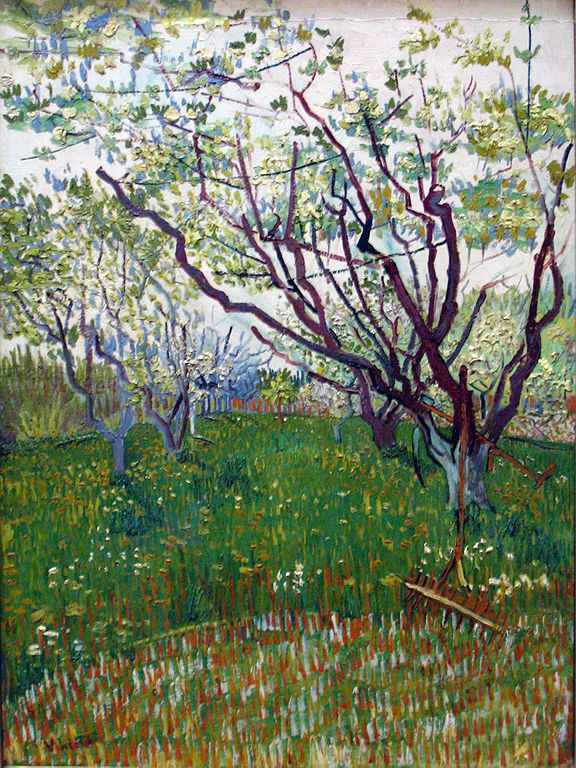The Catholic Worker Orchard at Tivoli

Vincent van Gogh, “The Flowering Orchard”; 1888; Metropolitan Museum, New York; courtesy of commons.wikimedia.org
There is a sense of satisfaction in planting a tree. Usually it will be around far longer than the planter. The oak that Shelley planted as a child at his family home became a memorial. People still collect leaves from trees near Tolstoy’s grave, trees that shaded him on his walks through Yasnaya Polyana. There are good reasons for planting trees. Even a Tolstoy had to be reminded of life’s brevity. Planting a tree that will shelter our grandchildren, and theirs, can silence us before a vast and timeless nature, so still, so much more in touch with the timeless than busy people.
Trees speak to us of being rooted—in the earth where we shall all end, a harsh equality. If we say that home is as a tree, we say that home is a rooted place, a place for us to set down and establish ourself, to nurture ourself. We say, let us put our roots down so that we may grow. It is a resolution too few of us are willing to make in this hasty age. To plant a tree is to signify a home. All around, the land becomes a new place, to stay and grow.
Nature’s Balance
Two years ago we planted an organic orchard at Tivoli: apples, pears, plums, peaches, and cherries—fifty-five trees in all. It is complicated, growing fruit trees; they are our pampered children. At planting they must get the right balance of soil to manure (4 or 3 to 1), and just the right spot with a lot of sun and a good circulation of air. At first they will need constant tending. They must be pruned so that the proper branches grow the proper way with the proper strength, mulched (preferably with hay, though orchard grass will do), cultivated, weeded and watched. The saplings will need water in drought times, but it should not set or the young growth may rot; some trees nearby must be moved. The sumac does not like orchards. It thinks it owns every field. It sends out underground roots that throw up shoot after shoot; whole groves spring up and have to be uprooted as that pear or that apple is threatened with choking.
The deer, field mice, aphids and worms eat the young trees. But the trees have friends. Birds eat the bugs. They nest beneath wild roses and in dogwood bushes. Throughout our orchard we have kept the roses and dogwood. Forty varieties of birds feed on dogwood, an old farmer told us. Ladybugs, spiders and praying mantis eat aphids and other destructive insects. We purchased box loads of ladybugs and dispersed them as if seed. There is a balance in nature, but no orchard begins balanced because it is human made. It is balanced in time with a lot of work and cooperation with nature, cooperation between friends. The landscape is altered when you grow fruit; this stream needed a little diverting, this honey locust was in the way; a sapling oak is transplanted, some cedar trees that cause a lethal apple disease are moved or cut down if diseased themselves. Slowly the orchard takes shape, and begins to fit and fill the land; some trees in blossom already show the shape of our planting.
All trees teach. We sit humble beneath them as pupils. With fruit trees we learn by doing. Orchards do not want to be left alone. They say, help, and if you help properly look what we can give back to you, gifts among friends. Taking responsibility and treating our fruit trees with respect, as one with them, the oneness of all living beings of which Gandhi spoke so often, is this not the ahimsa of fruit growing? Orchards take a long time to grow. There is something in a fruit tree, in all trees, that tells us how to live, more silently, more considerately, but more at home too, in the fertile land that is our earth.
A NOTE ON THE TEXT: This is a slightly revised version of an article that appeared in The Catholic Worker, July-August, 1975; p, 7. Courtesy of The Catholic Worker, and the Marquette University Catholic Worker archive.
EDITOR’S NOTE: Joseph Geraci is the director of the Satyagraha Foundation and editor of our website. His last novel is The Path of the Gods (Strand Publishing, London). At the time of writing this he was living fulltime at the Catholic Worker Farm in Tivoli, New York.




